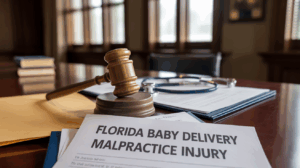
When a child suffers a birth injury, the emotional and physical toll can be overwhelming. In the midst of medical treatment and life adjustments, many parents wonder whether they have legal options and, if so, how long they have to act. There is a time limit for filing a birth injury claim, and it is known as the statute of limitations.
Understanding this law and the exceptions that may apply to your case is vitally important to protect your family’s rights. If your newborn has suffered an injury during childbirth, and you have questions about getting the care you need and the time you have to pursue compensation, a birth injury lawyer in Fort Lauderdale may be able to help.
What Is A Birth Injury Claim?
A birth injury claim is a type of medical malpractice lawsuit that seeks compensation for harm caused to a newborn during pregnancy, labor, delivery, or shortly after birth. These claims may arise from negligence by doctors, nurses, hospitals, or other healthcare providers. Common causes include:
- Improper use of forceps or vacuum extractors
- Failure to monitor fetal distress
- Delayed C-section
- Oxygen deprivation
- Medication errors
When this negligence leads to a birth injury, such as cerebral palsy, brachial plexus injury, or developmental delays, legal action may be appropriate.
Why Time Limits Matter On A Birth Injury Claim
Every state has a statute of limitations, a legal deadline for filing a lawsuit. If you miss this deadline, you may lose the right to seek compensation, no matter how strong your case may be. That’s why understanding the applicable time limit is critical, even during a period of grief or medical uncertainty.
Statutes Of Limitations For Birth Injuries Vary By State
Birth injury claims fall under medical malpractice law, and each state sets its own rules. In some states, the clock starts ticking from the date of injury, while others use a discovery rule, which starts the clock from the date the injury was discovered or reasonably should have been discovered.
For example, Florida’s statute of limitations for medical malpractice claims falls underFlorida Statutes § 95.11. That statute is typically two years from the date of discovery, with an overall cap (statute of repose) of four years from the date the malpractice occurred. Under certain conditions, the claim could be brought before the child’s eighth birthday.
As you can see, conditions in your case could alter the deadline, which is why it’s so important to consult with a birth injury attorney who understands the laws in your state.
Exceptions That May Extend Filing Deadlines
There are limited situations where the statute of limitations may be extended, referred to legally as tolling. These exceptions include the following:
Delayed Discovery Of The Birth Injury
As mentioned above, the statute of limitations may begin when the injury is discovered. Some birth injuries are not immediately apparent. Developmental delays or cognitive issues might not surface until years after birth, such as cerebral palsy.
In many states, the discovery rule allows families to file a claim once they learn or should reasonably have learned that the injury was connected to medical negligence.
Age Of The Victim
In most jurisdictions, time limits are extended for children because they lack the legal capacity to file a lawsuit. Depending on the state, the clock may not begin until the child turns 18, though some states impose a hard cutoff date regardless of age.
Fraud Or Concealment
If a healthcare provider concealed or misrepresented facts about the injury, the statute may be tolled until the deception is discovered. This can be difficult to prove, but may apply in certain cases.
What Happens If You Miss The Statutory Deadline?
If the statute of limitations expires, courts generally will not allow the case to proceed. Losing the right to file a birth injury lawsuit could mean losing the chance to seek the following:
- Compensation for ongoing medical care
- Payment for therapy and special education
- Coverage for medical equipment and assistive technology
- Recovery of lost income if one parent had to stop working
- Damages for pain and suffering
Missing the deadline not only closes the door to financial compensation but also prevents holding medical providers accountable. Taking timely action preserves your legal rights and gives your child the best chance of a secure future.
What You Can Do Now To Help Your Child’s Claim
If you suspect a healthcare provider’s negligence caused your child’s injury, it’s important to act quickly. Here’s how to start:
- Document everything: Medical records, discharge summaries, birth reports, and imaging results are all valuable.
- Track the timeline: Write down when you first noticed symptoms or were told something was wrong.
- Request a copy of your child’s complete medical history: This can help uncover any signs of negligence.
- Consult a birth injury attorney in your state: A law firm can explain your legal options and ensure deadlines are met.
Taking these steps early can help protect your rights and improve your chances of recovering damages to support your child’s care.
Frequently Asked Questions Regarding Birth Injury Claims
Below, we provide answers to parents’ common questions regarding birth injuries and seeking compensation for their children. Plus, we invite you to call our legal team and discuss your case during a complimentary case consultation.
Can I File A Claim If The Injury Wasn’t Discovered Right Away?
Yes, in many states, the statute of limitations starts from the date of discovery, not the date of birth. However, every state has limits on how long discovery delays can extend the deadline.
What If I’m Still Waiting On A Diagnosis?
Even if you don’t yet have a definitive diagnosis, speak with a birth injury attorney near you. Early legal guidance helps you avoid missing critical deadlines.
Can I File On Behalf Of My Child?
Yes. Parents or legal guardians typically bring the claim on the child’s behalf, and in most cases, any financial recovery is placed in a trust or court-approved account for the child’s benefit.
Don’t Let The Clock Run Out, Call Anidjar & Levine
Birth injury cases are complex, and the law places strict limits on your time to file. Each day that passes makes it harder to gather records, find witnesses, and build a strong case. Whether your child’s injury is clear or still emerging, the law doesn’t always wait for clarity.
Call Anidjar & Levine today for a free case consultation.










